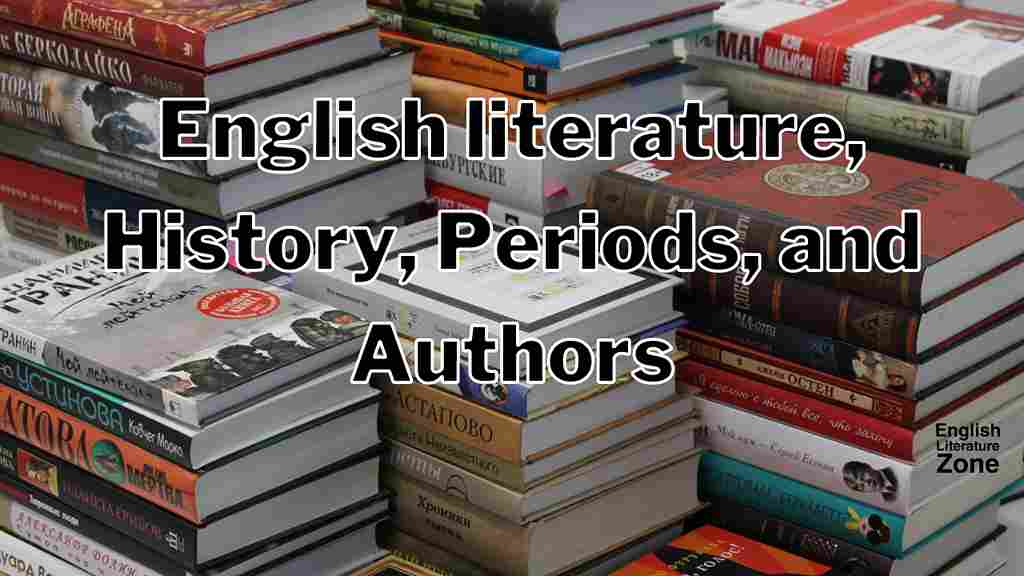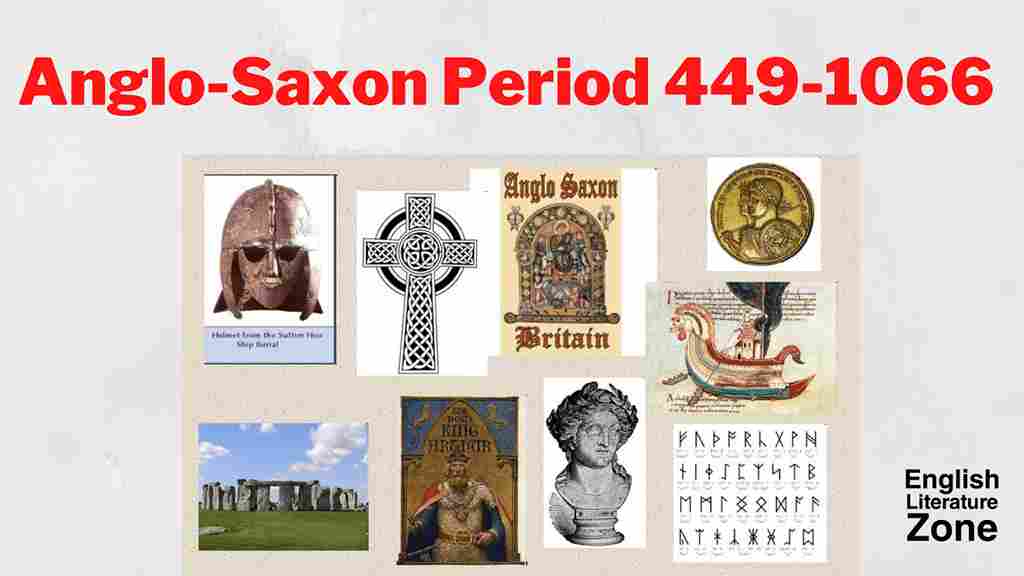What is English Literature, Origin, Definition, History, Periods, and Authors

Definition Of English Literature
English literature is the study and analysis of written works produced in the English language. It encompasses a wide range of texts, including poetry, novels, plays, and non-fiction, spanning from the Anglo-Saxon period to the present day.
Literature simply refers to any piece of writing that is valued as a work of art. In a general sense, it is the expression of human thoughts, feelings, and experiences. Literature can display both good and bad aspects of society. Hence, literature can be regarded as a mirror of society whatever changes the society undergoes they will be reflected in contemporary literature in one way or the other. Literature then is a successful medium to express human emotions: sadness, happiness, pleasure, pain, love, hate, fear, disgust, and anger such human emotions in literature are expressed artistically through language. It means literature needs to be beautiful and trustworthy.
Origin Of Literature
The word “literature” originated from the Latin word “literatura” which means “learning, writing, grammar.” This word was formed from “litera” which means “letter” or “character.” It was used in the context of education and learning, specifically the study of written texts. In the Middle Ages, the term “literature” was used to refer to the works of scholars and poets, and it was not until the 18th century that the term began to be used more broadly to refer to all written works.
Authors
One of the most iconic works of English literature is William Shakespeare’s plays. His plays are still performed and studied all over the world. Other notable works include the epic poem Beowulf, the novel Pride and Prejudice by Jane Austen, and the novel Wuthering Heights by Emily Bronte. Geoffrey Chaucer (1340s – 1400) has been called the “father of English literature“, or, alternatively, the “father of English poetry“.
Study Of English Literature
The study of English literature can encompass many different elements, including literary history, literary theory, literary criticism, and literary analysis. It can also encompass the study of literary movements and genres, such as the Romantic period, the Gothic novel, and the sonnet.
In addition to studying the literary texts themselves, the study of English literature also often involves the examination of the historical, cultural, and social contexts in which the texts were produced. This can include studying the life and times of the author, as well as the cultural and political climate of the period in which the text was written.
The study of English literature can also encompass the analysis of literary form and technique, such as the use of symbolism, imagery, and metaphor. It can also encompass the study of literary genres, such as novels, poetry, and drama.
Overall, the study of English literature is a diverse and multifaceted field that offers a wide range of opportunities for exploration and analysis. Whether you are interested in the literary texts themselves, the historical and cultural contexts in which they were produced, or the technical elements of literary form and technique, there is something for everyone in the field of English literature.
History Of English Literature
English literature and history are closely intertwined, as the literature of a particular time period is often a reflection of the historical and cultural context in which it was produced.
Old English Period (Anglo-Saxon Period) 449 to 1066
The history of English literature dates back to the Anglo-Saxon period, which lasted from the 5th to the 11th century. During this time, literature was primarily oral and was passed down from generation to generation through storytelling and song. Some of the most notable works from this period include the epic poem Beowulf, which tells the story of a heroic warrior and his battles with monsters, and the poem The Seafarer, which reflects on the themes of exile and the sea.
Middle English Period (1066-1500)
The Middle Ages, which lasted from the 12th to the 15th century, saw the emergence of written literature in the form of Chaucerian poetry, as well as the emergence of the first plays and dramas. Some of the most notable works from this period include The Canterbury Tales by Geoffrey Chaucer and the plays of William Shakespeare.
Renaissance Period (1500-1600)
The Renaissance Period, which lasted from the 16th to the 17th century, saw a renewed interest in the classical literature of ancient Greece and Rome, as well as the emergence of the novel as a literary genre. Some of the most notable works from this period include the plays of Shakespeare, the poetry of John Milton, and the novels of Daniel Defoe.
Neoclassical Period (1600-1785)
The 18th century, also known as the Age of Enlightenment, saw the emergence of the novel as a dominant literary form and the rise of the novel of sensibility, which focused on the emotional experiences of characters. Some of the most notable works from this period include the novels of Jane Austen, the poetry of William Wordsworth, and the plays of Oliver Goldsmith.
Romantic Period (1785-1832)
The 19th century, also known as the Romantic period, saw a renewed interest in nature and emotion, as well as the emergence of the Gothic novel. Some of the most notable works from this period include the novels of Jane Austen, the poetry of Lord Byron, and the plays of Oscar Wilde.
Modern History Period
The 20th century saw a continuation of the trends established in the 19th century, with the emergence of the modernist movement and the rise of the novel as a dominant literary form. Some of the most notable works from this period include the novels of James Joyce, the poetry of T.S. Eliot, and the plays of Samuel Beckett.
The history of English literature is also closely tied to the history of England. Many of the literary works from different time periods reflect the political and social changes that were taking place in the country at the time. For example, the literature of the 18th century reflects the rise of the middle class and the emergence of new economic and political systems, while the literature of the 19th century reflects the industrial revolution and the rise of the working class.
It’s important to note that English literature and history are not limited to England alone, it also encompasses the literature and history of the British Isles and its colonies. This includes literary works produced in Ireland, Scotland, and Wales, as well as literature produced by writers of the British Empire, such as Rudyard Kipling, Chinua Achebe, and Joseph Conrad.
English Literature As A Subject
English literature refers to written works produced in the English language. It encompasses a wide range of texts, including poetry, novels, plays, and non-fiction, from the Anglo-Saxon period to the present day. The study of English literature includes literary history, literary theory, literary criticism, and literary analysis of the texts themselves, as well as the examination of the historical, cultural, and social contexts in which the texts were produced.
Literature also encompasses the analysis of literary form and technique, such as the use of symbolism, imagery, and metaphor, as well as the study of literary genres, such as the novel, poetry, and drama. Additionally, the study of English literature also encompasses the analysis of contemporary literature and popular culture, including the study of film, television, and digital media.
Conclusion
Thus, literature is a vital record of what men have seen in life, what they experienced of it, and what they have thought and felt about those aspects of it
that have the most immediate and enduring interest for all of us. It was thus fundamentally an expression of life through the medium of language. Literature could be said to be a sort of disciplined technique for arousing certain emotions.
It begins with the creative possibilities of human language and the desire of human beings to use their language creatively. Literature enriches our lives because it increases our capacities for understanding and communication. It helps us to find meaning in our world to express it and share it with others. And this is the most humane activity of our existence.
Overall, the study of English literature and history offers a rich and diverse field of exploration, providing insight into the cultural, political, and social contexts of different time periods and the literary works that were produced during those times. Whether you are interested in the literature itself or the historical and cultural contexts in which it was produced, there is something for everyone in the field of English literature and history.
- Mechanical Reproduction By Walter Benjamin | The Work of Art in the Age of Mechanical Reproduction
- The Interpretation of Dreams By Sigmund Freud
- Victorian Period | Victorian Literature and Culture
- Dear Life by Alice Munro Summary, Themes, & Analysis
- The Lotos-eaters by Alfred Lord Tennyson
- Studies in the History of the Renaissance
- The Prologue to The Canterbury Tales By Geoffrey Chaucer
- Hayavadana By Girish Karnad | Hayavadana Themes & Analysis
- The Bluest Eye By Toni Morrison | The Bluest Eye Summary
- Top Girls By Caryl Churchill | Top Girls Analysis
Are you struggling to keep up with your English Literature Coursework? Do you need detailed, customized English Literature Notes to help you better understand the texts you’re studying? “Look no further! Our customized paid notes will help you achieve your study goals quickly.
What is English Literature, Origin, Definition, History, Periods, and Authors Read More »











